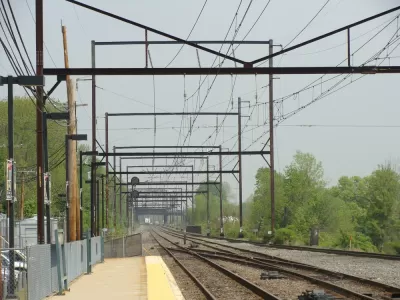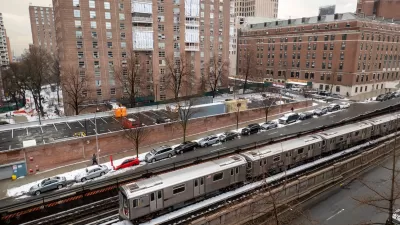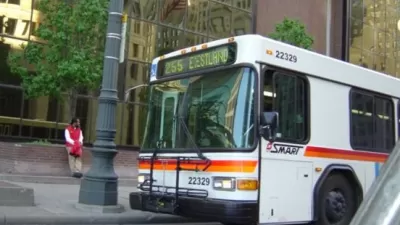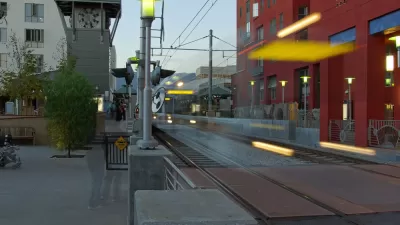With ridership revenue down, agencies seek to diversify their revenue stream by taking a more active role in developing agency-owned land.

With transit ridership down 79% in 2020 and a nationwide budget shortfall of close to $40 billion, writes Nate Berg for Fast Company, struggling public transit agencies are looking to revive their revenue through other means. Because many of them own land near their transit lines, some agencies are looking to the development of transit-agency-owned land as a potentially significant revenue source.
Until recently, most transit agencies used their land for surface parking, hoping ample parking near transit stations would draw more riders. But Jessie O'Malley Solis, transit-oriented development manager for the Santa Clara Valley Transportation Authority, says that in their area, it didn't work that way. "Just building seas of parking wasn’t going to generate ridership. You needed to generate connectivity along the system to make it valuable for riders." Now, as residents in Silicon Valley struggle to find housing in one of the country's least affordable markets, VTA is making plans to turn some of its land into "new transit-adjacent community hubs" and hopes its own development will have a ripple effect that encourages more private development near station areas. "O’Malley Solis says the development is always geared toward improving ridership and making more transit-oriented communities—whether it’s on land the agency owns or not."
While transit-oriented development isn't a silver bullet for increased ridership, "when done well, these projects can make an impact" on commuter mode share as well as increase the availability of affordable housing and the sustainability of transit agency budgets.
FULL STORY: Facing a $40 billion shortfall, U.S. transit agencies jump into real estate

Alabama: Trump Terminates Settlements for Black Communities Harmed By Raw Sewage
Trump deemed the landmark civil rights agreement “illegal DEI and environmental justice policy.”

Study: Maui’s Plan to Convert Vacation Rentals to Long-Term Housing Could Cause Nearly $1 Billion Economic Loss
The plan would reduce visitor accommodation by 25% resulting in 1,900 jobs lost.

Planetizen Federal Action Tracker
A weekly monitor of how Trump’s orders and actions are impacting planners and planning in America.

Restoring Northern India’s Himalayan ‘Water Temples’
Thousands of centuries-old buildings protect the region’s natural springs and serve as community wells and gathering places.

Milwaukee to Double Bike Share Stations
Bublr Bikes, one of the nation’s most successful, will add 500 new e-bikes to its system.

DC Extends Application Window for Outdoor Dining Permits
District restaurants will have until the end of November to apply, but businesses with permits in rush hour parking lanes must end operations on July 31.
Urban Design for Planners 1: Software Tools
This six-course series explores essential urban design concepts using open source software and equips planners with the tools they need to participate fully in the urban design process.
Planning for Universal Design
Learn the tools for implementing Universal Design in planning regulations.
Caltrans
Smith Gee Studio
Institute for Housing and Urban Development Studies (IHS)
City of Grandview
Harvard GSD Executive Education
Toledo-Lucas County Plan Commissions
Salt Lake City
NYU Wagner Graduate School of Public Service





























